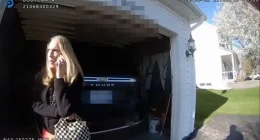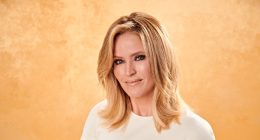[This story contains spoilers for Andor season one.]
Andor star Diego Luna has seen it all on Star Wars sets. From the Rogue One reshoots that introduced him to future Andor creator Tony Gilroy, to the pandemic production of their Disney+ series’ first season, Luna has become accustomed to high-pressure environments in a galaxy far, far away. But regardless of how the sausage was made, both his projects have led to resounding wins.
Rogue One: A Star Wars Story (2016) grossed over $1 billion at the worldwide box office, and in terms of its positive reception, it’s one of the few modern-day Star Wars titles that fans and critics agree on for the most part. And led by the auteur voice of Gilroy, Andor became Star Wars’ most critically acclaimed Disney+ series yet, as its writing is as nuanced and complex as other prestige shows like Better Call Saul and Succession. The series also marks the first time that Star Wars has moved away from four-quadrant storytelling and into more mature territory.
Perhaps Luna’s past experience on Rogue factored into his headspace on the set of Andor season one, but the production went so well on a creative level that he kept expecting the rug to be pulled out from under him — only it never happened.
“I always had a feeling that this wasn’t gonna see the light [of day] till it did. I kept going, ‘This is too perfect. This is working,’” Luna tells The Hollywood Reporter. “So everything just kept getting better and better, and I always had the feeling that something had to go wrong. But it didn’t. We had the freedom and the support of Disney and Lucas[film]. We had the confidence of Kathy [Kennedy] behind the show.”
Luna is currently shooting season two of Andor in England, and while the season one finale ended with Cassian Andor offering his life to the Rebellion, he still has a ways to go before he becomes one of the brave Rebel heroes in Rogue One.
“He says he wants to be a part of the Rebellion, but I’m not sure if he knows what that means yet. He’s basically saying, ‘I want to speak the language,’ but now he has to learn it,” Luna shares. “And so it’s going to take longer. We’re gonna go for four years [in season two], and when we find him, he’s so far away from where we left him at the end of season one. He’s basically the guy to trust for something like that mission.”
Below, during a recent conversation with THR, Luna also discusses how the cast and crew of Andor season two are not resting on their laurels whatsoever.
So has the critical acclaim for Andor made you regret, to some degree, not doing five seasons like originally planned?
No, definitely not. (Laughs.) We managed to make the series we made because we took the time we took. The thought of making five seasons, I would probably be 54 and still doing this. So it’d be impossible to pretend to be the guy before Rogue One for such a long time, and to be honest, it’s such an intense journey. It’s fantastic, but it’s so intense. And so it’s great to know that we can give everything to it, and by the end, still have something else to give to other projects and to life.
This demands you to go on a journey that doesn’t stop, and that’s the big difference from film. When one process ends, the next one starts right away, and many times they overlap. Even right now, I’m still talking to you about the first season, but I was late because we are shooting the second season and we took a little longer today than usual. When I did promotion at the time that episode six was out, I was still looping episode twelve for Spanish-speaking audiences. And at the same time, I was rehearsing and getting ready for season two. So it’s intense.

Knowing what you know now about the character, does part of you wish you could go back and play Cassian in Rogue One again?
Hmm. I’ve never thought that way because we were able to tell this story by knowing the end. It was always a reference that Cassian gets there, so how far can we go back? How twisted can we make the journey to get there? How many times can he fail before getting there? How conflicted can we make him? How contradictory can we make it? And it was always because we had that reference. So my brain works differently, and I’m more obsessed with sticking to what’s already there.
I remind myself all the time of where the character ends up and what choices I made, because that gives structure to everything I’m doing now. So I’m starting the other way around. It’s less, “Oh, I wish,” and it’s more like, “Okay, because I get there, I can do this.” So that is where I found freedom and all the different ways I can get there. And then I’ll think about what is the most unpredictable one. So, all the layers we didn’t get to see in the film, I get to explore them now. If I had tried them at the time, then I wouldn’t be able to explore them now. So it’s just a perspective kind of thing. The freedom comes from knowing exactly what he does.

Did chills go down your spine when you learned that Cassian helped build the Death Star that would ultimately kill him?
Yeah, they did. I had time to digest that because I’m also involved as a producer. So I had a chance to see it coming, but it’s one of those ideas that’s just brilliant. It’s also not obvious. He spent a quite long time living the experience of that prison without finding it out, and it allows you to wonder, “Holy shit, what are they building? Could this be …?” One of the many things that the show has is very patient writing. There are great ideas that come with patience. So it’s very mature writing, and that was one of those reveals where you were like, “Shit, that’s so smart.”
Speaking of mature writing, when you read that the series begins with Cassian visiting a brothel and eventually killing two cops, did part of you think that Disney wouldn’t let you guys get away with that?
It wasn’t just that; I always had a feeling that this wasn’t gonna see the light [of day] till it did. (Laughs.) I kept going, “This is too perfect. This is working.” The whole idea, I always thought, “That’s impossible.” Throughout the whole process, we did exactly what we thought was best. We never prioritized anything but the show. The writing took the time it needed to take, and we got the best cast you can have. So everything just kept getting better and better, and I always had the feeling that something had to go wrong. But it didn’t. We had the freedom and the support of Disney and Lucas[film]. We had the confidence of Kathy [Kennedy] behind the show.
You keep hearing in this industry that this is impossible and that this doesn’t happen. I grew up thinking that the cinema and the art I love was not popular, but this is a show I love. This is a show I would recommend as the audience, not just as the actor or a producer. So, it wasn’t just the opening. Many times throughout the whole process, I found myself being impressed and surprised that this was happening. And I felt proud of it. Even today, I feel not just lucky, but fortunate to be a part of something like this and to be working with people I believe in. We have a team and we have a structure that keeps pushing us to be better and to take more risks and to get further. So it’s quite impressive from every angle. It happens on every level of the show, with every department.

Was there ever a point where you struggled with Cassian’s decision-making?
Not really, because I always felt like I was a part of the decisions and the choices and the story. I could talk about Tony Gilroy all day, but one of the crucial things he does that makes him and his writing so different is that he gets you involved from scratch. Therefore, the moment it’s on the page, you own it. You’re a part of it. You feel a part of it. So, good or bad, it’s now in your hands and you have to make sure you fight for that.
Tony will sit down with the production designer [Luke Hull], and he’ll say, “Okay, what is the logic of that room? Where are the windows?” And then Luke will make a quick drawing for when Tony is writing the scene that happens in that room. Therefore, Luke’s logic is already on the page. So that is something special. Usually, the writing happens somewhere else, and then you have to interpret it and bring it into a grounded situation. Tony makes you a part of the writing from scratch, so you’ll defend that logic all the way to the end. That doesn’t mean it’s easy, but from there, anything is possible.
At the end of season one, Cassian is ready to commit himself to the Rebellion. Is he going to have some growing pains in season two?
Yeah, he says he wants to be a part of the Rebellion, but I’m not sure if he knows what that means yet. He’s basically saying, “I want to speak the language,” but now he has to learn it. And so it’s going to take longer. We’re gonna go for four years [in season two], and when we find him, he’s so far away from where we left him at the end of season one. He’s basically the guy to trust for something like that mission.

Is everyone feeling pretty confident right now because season one was so well received?
I don’t think confident is the word. What happened with season one comes with a lot of responsibility, and Tony Gillroy is the kind of writer that won’t let us just relax and celebrate. Tony and his whole team are bringing it. They’re bringing more and more challenges into the mix, and structurally, it’s different. So I don’t think we are confident; I think we are just enjoying it in a way that we didn’t enjoy the first season.
We also have to acknowledge that we shot the first season in the worst times of the pandemic. We were one of the first shows that went out there and started shooting. So that moment in everyone’s life and their families was so emotionally charged. For quite a while, we were told that what we loved doing was not essential, and then we tried to convince ourselves that we were still capable of shooting the series with the level of quality, commitment and vision that we always wanted. So the journey was really tough for many of us, as life was for everyone on this planet. So we are enjoying season two in a different way.
Well, Diego, congrats again on Andor season one. It’s truly my favorite Star Wars story since the ‘80s.
Thank you for your support and for telling me these beautiful things and for giving us a chance to celebrate this experience. The beauty of what’s happening is that other shows like this can start to come out. It might become contagious, and I’m excited by that.
***
Andor is now streaming on Disney+. This interview was edited for length and clarity.
Source: Hollywood









